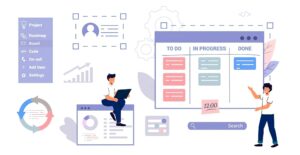Define Real Estate Lease Management Software
Real estate lease management software is a type of software that helps real estate companies manage their lease agreements, rent payments, and tenant information. This software typically includes lease tracking, rent collection, automated reminders, tenant communication tools, and reporting capabilities.
Many types of real estate lease management software are available, each with its own features and benefits. Some popular options include:

- FQMS Leasing Management: Managing leasing for real estate and implementation includes many things that have to be complex. FQMS leasing management software concludes the substantial elevating for you.
- Yar-di: Yar-di is a popular real estate management software that offers a wide range of features, including lease management, accounting, and property management tools.
- AppFolio: AppFolio is another popular option that offers lease management features, as well as tenant screening tools, online payment processing, and maintenance tracking.
- Buil-dium: Bui-ldium is a cloud-based real estate management software that offers lease tracking, rent collection, and tenant communication tools, as well as features for managing maintenance requests and work orders.
- Co-Star: Co-Star is a comprehensive real estate management platform that includes lease management, property management, and commercial real estate research features.
- Lease-Query: Lease Query is a cloud-based lease accounting software that helps real estate companies manage their lease agreements and ensure compliance with accounting standards.
When choosing a real estate lease management software, it’s essential to consider the specific needs of your business and select a solution that aligns with those needs. Factors to consider include:
- The number of properties you manage.
- The size of your team.
- Your budget for software solutions.
Attributes of Real Estate Lease Management Software
Real estate lease management software is designed to help property managers and landlords manage their leases more effectively. Here are some common attributes of real estate lease management software:

- Lease tracking: The software should allow you to track all the essential details of your leases, including lease start and end dates, rent amounts, and security deposit amounts.
- Automated alerts: The software should provide automatic alerts to remind you of important lease dates, such as lease renewals and rent increases.
- Tenant management: The software should allow you to manage your tenants’ information, such as contact details, lease terms, and rent payments.
- Financial management: The software should enable you to manage your finances related to the leases, including rent collection, security deposits, and expenses.
- Reporting and analytics: The software should provide reporting and analytics features that allow you to track important metrics, such as occupancy and rent collection rates.
- Customization: The software should allow you to customize the platform to suit your needs, such as adding custom fields or creating your own reports.
- Integration: The software should integrate with other systems, such as accounting or property management.
- User-friendly interface: The software should have a user-friendly interface that makes it easy to use and navigate.
- Security: The software should have robust security features to protect sensitive data, such as lease agreements and tenant information.
- Mobile access: The software should provide mobile access so that you can manage your leases and tenants on the go.
Advantages of Real Estate Lease Management Software
Real estate lease management software has several advantages, including:

- Streamlining lease administration: The software can automate tasks such as rent payments, lease renewals, and maintenance requests, freeing up valuable time for property managers and staff.
- Centralized lease data: Real estate lease management software enables property managers to store all lease data in one place, making it easy to access and update lease agreements, rental payments, tenant contact information, and other important details.
- Improved accuracy and compliance: Real estate lease management software can reduce the risk of errors and omissions in lease agreements and ensure compliance with local, state, and federal regulations.
- Better communication: Real estate lease management software provides a platform for landlords and tenants to communicate more effectively, helping to resolve issues and build stronger relationships.
- Enhanced financial reporting: The software can generate reports on rental income, expenses, and occupancy rates, providing property managers with valuable insights into their real estate portfolio’s financial performance.
- Time and cost savings: By automating many of the time-consuming tasks involved in lease management, real estate lease management software can help property managers save time and reduce costs.
Overall, real estate lease management software can help property managers streamline their operations, improve communication with tenants, and make more informed decisions about their real estate portfolio.
Disadvantages of Real Estate Lease Management Software
There are several potential disadvantages of using real estate lease management software, including:

- Cost: Real estate lease management software can be expensive to purchase, implement, and maintain. The cost may be prohibitive for small or medium-sized businesses.
- Learning curve: Depending on the software, there may be a steep learning curve for users who are not familiar with the system. This can result in lost productivity and frustration for employees.
- Integration: Some real estate lease management software may not integrate well with other systems or software, which can lead to data discrepancies or the need for manual data entry.
- Customization: Not all software may be customizable to suit the specific needs of a business. This can result in limitations in functionality and may require workarounds or additional tools to achieve desired results.
- Technical issues: Like all software, real estate lease management software is susceptible to technical issues such as bugs, glitches, and crashes. This can result in downtime and lost productivity for users.
- Security: Depending on the software, there may be concerns around data security and the safety of sensitive information such as lease agreements, rent payments, and tenant information. It is important to ensure that any software used is compliant with data protection regulations.
- Limited support: Some software providers may not offer sufficient support or training for their products, leaving users to fend for themselves when issues arise or they need guidance on how to use certain features.
Overall, it is important to carefully evaluate the potential drawbacks of real estate lease management software before making a decision to implement it in your business.
